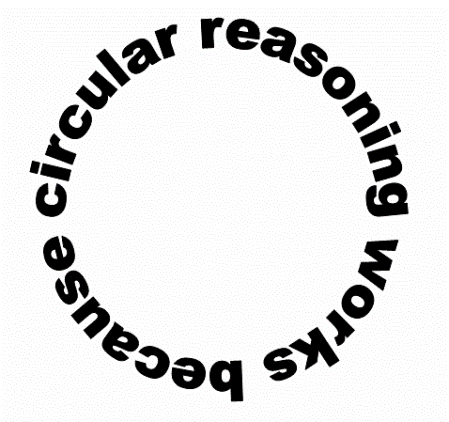Psalm 115:3
But our God is in the heavens; He does whatever He pleases.
Psalm 135:6
Whatever the LORD pleases, He does, in heaven and in earth, in the seas and in all deeps.
This is Circular Reasoning because it presumes Calvinism in order to prove Calvinism. We are told by Calvinists that unless we believe that God has decreed everything, then we might as well be “Atheists.” (Chosen By God, pp.25, 27) The Arminian response is that God couldn’t have decreed everything, because sin could not have been decreed by a holy God. (James 1:17)
God plainly tells us what does and does not please Him:
Ezekiel 33:11: “Say to them, ‘As I live!’ declares the Lord GOD, ‘I take no pleasure in the death of the wicked, but rather that the wicked turn from his way and live. Turn back, turn back from your evil ways! Why then will you die, O house of Israel?’”
1st Corinthians 1:21: “For since in the wisdom of God the world through its wisdom did not come to know God, God was well-pleased through the foolishness of the message preached to save those who believe.”
Hebrews 11:6: “And without faith it is impossible to please Him, for he who comes to God must believe that He is and that He is a rewarder of those who seek Him.”
John Calvin: “We also note that we should consider the creation of the world so that we may realize that everything is subject to God and ruled by his will and that when the world has done what it may, nothing happens other than what God decrees.” (Acts: Calvin, The Crossway Classic Commentaries, p.66, emphasis mine)
John Calvin: “If what I teach is true, that those who perish are destined to death by the eternal good pleasure of God though the reason does not appear, then they are not found but made worthy of destruction.” (Concerning the Eternal Predestination of God, p.121, emphasis mine)
Again, according to Calvinists, this understanding is a prerequisite to being a true Christian.
Non-Calvinist, Jim Foster, explains: “The part of God’s sovereignty that Calvinists don’t understand is that in His sovereignty, He gave us free wills. We are the ones who have taken that free will and decided to commit sin. Otherwise, God is somehow linked to all the world’s atrocities from the beginning of time and is ultimately responsible for them. The idea that God would ordain evil is contrary to everything the Bible teaches about God. A Calvinist would be forced to conclude - if God is good and is responsible for all evil - then evil must be good.”
Amazingly, Calvin indeed considered the evil things that exist, as “good,” being “omnipotent goodness,” and that people who doubt this, “imperil” their faith:
John Calvin: “...and how true is what the Psalmist sings in Ps 115.3: Our God hath done whatsoever He hath pleased. This would certainly not be true if He willed something and did not do them. Nothing therefore is done unless He omnipotently willed it should be done, either by permitting it to be done or by doing it Himself. Nor may it be doubted that God did well in permitting to be done all that is ill done. For this is not permitted except by righteous judgment. Hence, though the things that are evil, in so far as they are evil, are not good, yet it is good that there be not only good but also evil things. For unless there were this good, that evil things existed, they would by no means be permitted to exist by omnipotent goodness. For without doubt it is as easy for Him to do what He wills as to permit what He does not will. Unless we believe this, we imperil the beginning of our faith, by which we confess belief in God almighty.” (Concerning the Eternal Predestination of God, p.67, emphasis mine)
John Calvin: “Mighty therefore, are the works of God and excellent in all His acts of will, so that in a marvelous and ineffable way that cannot be done without His will which is yet done contrary to His will. For it would not be done if He did not permit it, and permission is given not without but by His will.” (Concerning the Eternal Predestination of God, p.68, emphasis mine)
If all that is “ill done” is done by God’s good pleasure, then how do you explain Jeremiah 32:35: “They built the high places of Baal that are in the valley of Ben-hinnom to cause their sons and their daughters to pass through the fire to Molech, which I had not commanded them nor had it entered My mind that they should do this abomination, to cause Judah to sin.” Does it make sense to say that what was abominable to God, simultaneously pleased Him, or that He decreed what never entered His mind? How does a secret will theory explain away this magnitude of contradiction with Calvinism?
One Calvinist argues: “If one ultimately agrees that God does whatever He pleases (Psalm 115:3), then one cannot but conclude that those who are not included in salvation are not included by God’s good plan and, therefore, ultimately, His good pleasure. Moreover, how is it possible that a Sovereign God, about whom Scripture plainly says He does what ‘He pleases’ (Psalm 115:3), would fail to save those whom He wants to save?”
What pleased God to do was to place salvation in His Son, and for His part, He is willing that all enter. Indeed, God does what He pleases, and God never sinned, nor does it please Him when others do it.
The logic goes like this:
Since God does whatever He pleases, and since He has decreed everything that comes to pass, everything must be pleasing to God. For if it pleased God to save everyone, then everyone would be saved.
